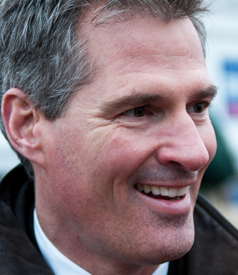Did you know that Truthout is a nonprofit and independently funded by readers like you? If you value what we do, please support our work with a donation.
Republican Scott Brown’s upset victory in the Massachusetts Senate race results portends huge challenges ahead for President Obama and majority Democrats. National health care reform may well stall, and new carbon-emissions rules are now unlikely. What will be the revised agenda?
Washington – For President Obama, Republican Scott Brown’s victory in the Massachusetts Senate race changes everything.
OK, that may be an exaggeration. The GOP’s triumph in a blue state may not change everything so much as reveal that everything has changed since Mr. Obama was inaugurated one long year ago.
Since then, the economy has continued to struggle, while unemployment has risen into the double digits. Meanwhile, voters have watched as financial and auto firms got bailed out and bankers continued to award themselves fat bonus packages.
The voters wanted change in 2008, and what they’ve got so far has been change they don’t like.
“I have no interest in sugarcoating what happened in Massachusetts,” said Sen. Robert Menendez (D) of New Jersey, head of the Senate Democrats’ campaign committee. “There is a lot of anxiety in the country right now. Americans are understandably impatient.”
The future of the Obama administration’s agenda now has become much less certain.
Healthcare Reform’s Dubious Future
Healthcare reform is in big trouble. There are maneuvers Democrats could use to try to ram legislation through despite losing their filibuster-proof, 60-seat Senate majority. But in the wake of Democrat Martha Coakley’s crushing loss, some moderate Democrats elsewhere in the country already are expressing reluctance to take any drastic steps.
Moderate Sen. Jim Webb (D) of Virginia, for instance, said the Senate should not hold any further votes on healthcare until Senator-elect Brown is seated.
House Speaker Nancy Pelosi (D) of California insisted that a healthcare bill will still pass, however. Liberal Democrats said that, if anything, the Brown victory meant they needed to move faster.
Cap-and-Trade for Carbon Emissions? Gone.
Obama’s ambitious proposal for cap-and-trade carbon-emission regulation, meant to combat global climate change, now is not going anywhere this year.
Cap-and-trade always faced a steep uphill climb. It would constitute as big a change in national policy as healthcare reform, maybe bigger. But lawmakers were never going to get around to considering it until after the healthcare fight was over.
Retiring Sen. Byron Dorgan (D) of North Dakota indicated Tuesday that the Senate is not likely to take up cap-and-trade at all in 2010.
“In the aftermath of a very, very heavy lift on healthcare, it’s unlikely that the Senate will turn to a very complicated and controversial subject of cap-and-trade,” Senator Dorgan told reporters.
Ahead, a More Intense Focus on Jobs and the Economy
So what initiatives will the White House pursue? Indications are that Obama may pivot from nation-changing initiatives to a more populist agenda focused on jobs and other aspects of the economy.
In recent days Obama has sounded almost like an angry participant in a “tea party” rally as he excoriated huge bonuses while proposing a new tax on big banks.
Every new US president reaches a point in his term where the agenda he brought with him to office no longer applies. The world has changed, and he has changed, and it is time to improvise in response.
For Barack Obama, Jan. 20, 2010, thus may mark the beginning of a new and difficult phase in his presidency.
A terrifying moment. We appeal for your support.
In the last weeks, we have witnessed an authoritarian assault on communities in Minnesota and across the nation.
The need for truthful, grassroots reporting is urgent at this cataclysmic historical moment. Yet, Trump-aligned billionaires and other allies have taken over many legacy media outlets — the culmination of a decades-long campaign to place control of the narrative into the hands of the political right.
We refuse to let Trump’s blatant propaganda machine go unchecked. Untethered to corporate ownership or advertisers, Truthout remains fearless in our reporting and our determination to use journalism as a tool for justice.
But we need your help just to fund our basic expenses. Over 80 percent of Truthout’s funding comes from small individual donations from our community of readers, and over a third of our total budget is supported by recurring monthly donors.
Truthout has launched a fundraiser to add 310 new monthly donors in the next 4 days. Whether you can make a small monthly donation or a larger one-time gift, Truthout only works with your support.
